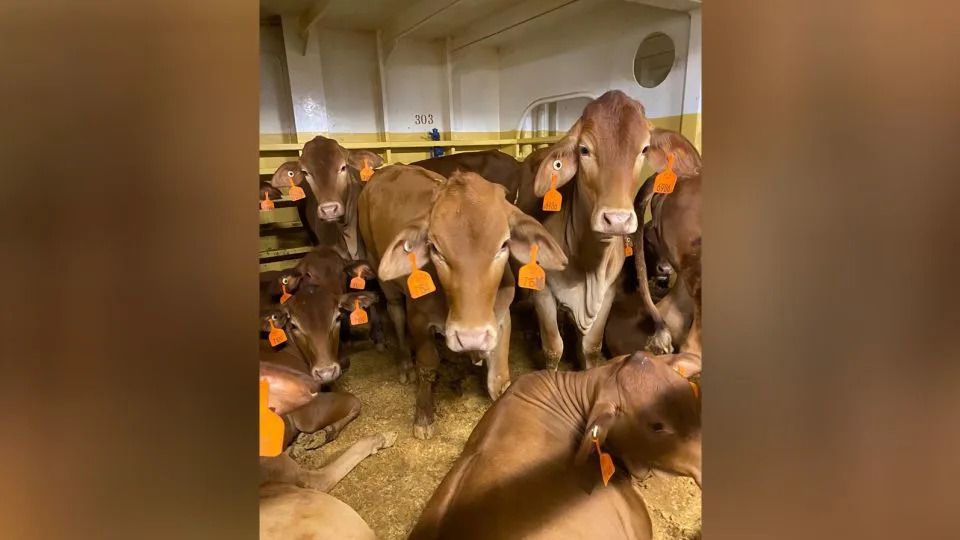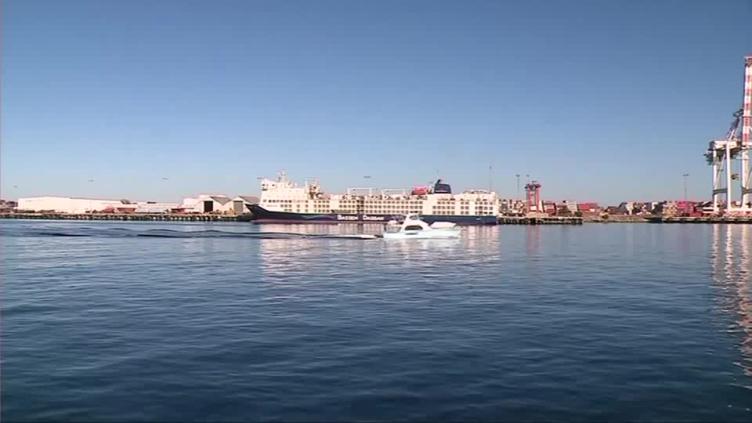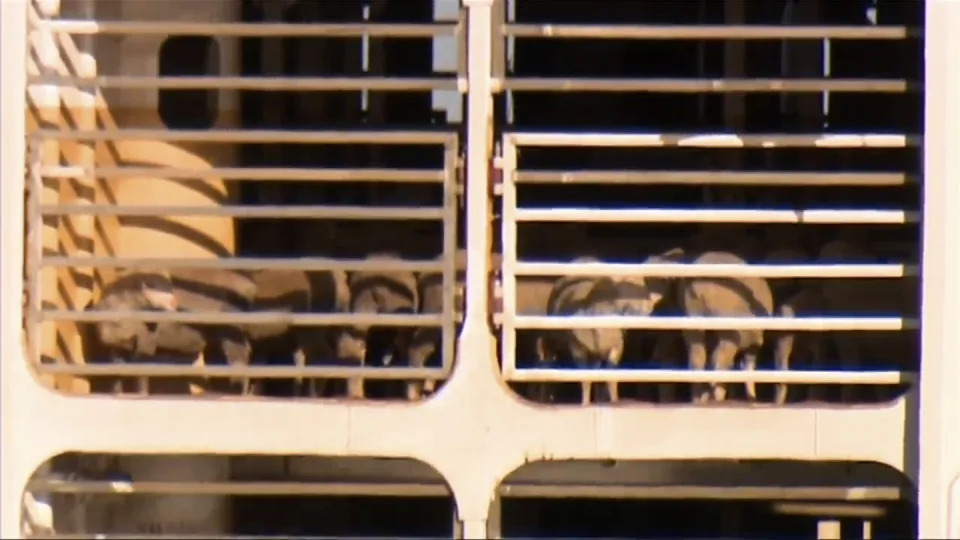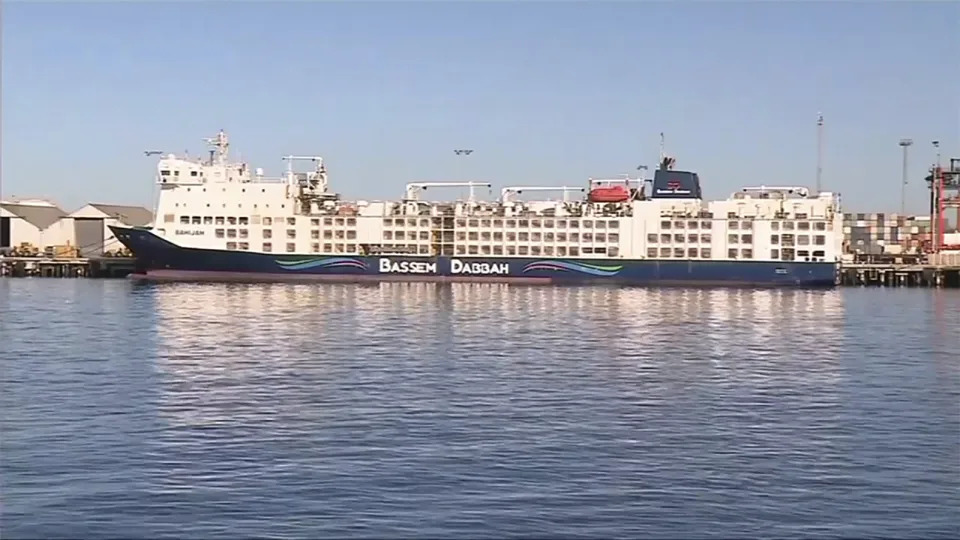Thousands of sheep and cattle stranded at sea after Red Sea crisis turn back
Hilary Whiteman, CNN
Fri, February 2, 2024
Concern is mounting for thousands of sheep and cattle stranded off the coast of Australia after authorities ordered the Israeli-owned ship transporting the live cargo to turn around over fears it could be targeted by Houthi rebels in the Red Sea.
More than 16,000 animals are aboard the MV Bahijah anchored off Western Australia, where sweltering heat is adding to pressure on the Australian government to decide whether to allow the ship to leave or offload the livestock following more than three weeks at sea.
The Department of Agriculture, Fisheries and Forestry said on Friday it was still considering an application from the exporter to re-export the animals. In the last two days, the ship has been cleaned and resupplied with fuel and fodder during temporary stays at Fremantle Port, near Perth, the government said.
No livestock have been offloaded, despite calls from animal welfare advocates to allow them off the ship as soon as possible.
Two independent veterinarians, engaged by the government, inspected the live cargo on Wednesday and found “no significant animal health or welfare issues,” the government said.
The Royal Society for the Prevention of Cruelty to Animals Australia (RSPCA) says a thorough examination of all the animals is impossible while they’re still on the ship.
Australia’s live export trade has long been a point of friction between the industry and those who say it prioritizes revenue over animal welfare.
The Australian government has pledged to end the live export of sheep but has yet to give a timetable about when that will happen.

More than 16,000 animals are on board the vessel. - Nine Network Australia
A long journey
The MV Bahijah left Fremantle on January 5 for the Middle East, according to a statement from the Australian government.
A crisis has enveloped the region’s vital Red Sea shipping lane in recent weeks, as Yemen’s Iran-backed Houthi rebels attack commercial vessels in what they say is retaliation against Israel for its military campaign in Gaza.
Fifteen days into the ship’s voyage, a request to divert the vessel around Africa, as other ships have done to evade Houthi missiles and drones, was rejected.
“To ensure the health and welfare of the livestock on the MV Bahijah, the department directed the exporter that the consignment be immediately returned to Australia,” said a government statement on January 20.
Earlier this week, the government said it was working with the exporter on a plan, but by Thursday, as summer temperatures rose, no decision had been made.
John Hassell, president of the Western Australian Farmers Federation (WAFarmers), which represents the state’s agricultural industry, said a decision should have been made days ago.
“I would have thought the department should have had its stuff sorted out well before it got here,” he said. “If the animals are in good nick, if there’s no disease if there’s plenty of space, we’ll (resupply the ship) and turn it away,” he said. “It should have been gone by now.”
Hassell said he’d been sent photos from the ship that show the animals in good condition, contrary to claims that conditions are deteriorating. The photos, shared with CNN, show cattle with tags on their ears, sitting and standing and sheep standing in a ventilated area.
“I’m comfortable that the sheep are in the shade sitting down, chewing their cud in the warm parts of the day and eating when it’s cooler, like they do on the farm,” Hassell said.

The MV Bahijah left Australia on January 5 with around 16,000 cattle and sheep on board. - WAFarmers
‘Grave’ concerns
However, Suzanne Fowler, Chief Science Officer with RSPCA Australia, said it’s a matter of urgency that all the animals are offloaded.
“These animals have now been on board the ship for a minimum of 26 days. The temperature in Perth is starting to touch 40 degrees (102 Fahrenheit),” she told CNN on Wednesday.
Temperatures in Perth hit a high of 41 degrees Celsius (105 Fahrenheit) on Thursday and it was almost as hot on Friday, according to the Australian Bureau of Meteorology.
“The evidence tells us that the welfare of the animals is only going to get worse and worse over the coming days due to the amount of time they’ve spent on the ship. So, it’s very urgent and we couldn’t be more gravely concerned,” Fowler said.
Hassell, from WAFarmers, said offloading the animals would only cause them more stress.
If allowed to disembark, the animals would be governed by Australia’s strict biosecurity system, which is designed to assure importing countries that the country’s livestock is disease-free.
Mark Harvey-Sutton, CEO of the Australian Livestock Exporters’ Council, said any animals taken off the boat would be placed into quarantine before being re-exported or killed in an Australian abattoir.
“They would essentially be in quarantine indefinitely until a market was found for them. There’s no two weeks quarantine and you’re out sort of thing.”
Hassell said the only reason some animals would be offloaded would be to create space for the return journey.
“If the animals have gotten bigger and fatter on the trip over and require more space, then that’s why they’ll be offloaded,” he said.
The RSPCA had requested permission for an independent veterinarian to board the ship to assess the animals.
Fowler said while the livestock may not be showing signs of illness now, it’s only a matter of time.
“The stress of the animals is only going to yield in the coming days and that sense of fatigue where they can’t cope anymore, will only worsen,” she said. “A lot of these diseases you won’t see until it’s too late.”
This story has been updated with additional information.
CNN’s Alex Stambaugh, Akanksha Sharma and Robert Shackelford contributed reporting.
16,000 livestock in month's limbo on Israel-bound ship
Reuters Videos
Updated Fri, February 2, 2024

STORY: It has been four weeks since this export ship set sail for Israel.
Yet the 16,000 livestock aboard remained in limbo at an Australian port on Friday (February 2).
It began its journey a month ago - only to abandon a passage through the Red Sea and be ordered home by the Australian government.
Biosecurity rules mean the animals, around 14,000 sheep and 2,000 cattle, can’t disembark without being quarantined.
Officials are yet to decide if they should be let off or sent back to sea…
On a 33-day voyage to reach Israel by going around Africa instead.
Australia’s agricultural secretary, Adam Fennessy.
“There should be no doubt that Australia’s biosecurity and the health and welfare of the livestock on board are our highest priorities. After standing offshore yesterday and yesterday evening and replacing the animal’s bedding, the vessel has returned to port and is birthed in Fremantle.“
Despite these assurances, some politicians and animal rights activists have branded these circumstances as cruel mistreatment -
Prompting calls for Canberra to bring forward a planned ban on live sheep exports.
The situation is a consequence of strikes by Yemen's Houthi militia on shipping in the Red Sea that have disrupted global trade.
The ship, MV Bahijah, abandoned its Red Sea route due to the threat of attack. It arrived on Monday (January 29) in Perth where there is currently a heatwave.
Australia's agriculture ministry said it’s still considering a request from the exporter, Israeli firm Bassem Dabbah, to unload some animals and re-export the rest.
Industry figures, dismissing claims the animals are suffering, asked why the government has taken so long to decide the ship's fate.
Reuters was unable to contact Bassem Dabbah - and the ship's manager did not respond to requests for comment.
A ship carrying thousands of livestock returns to Australia after month-long ordeal
Associated Press
Updated Fri, February 2, 2024


Australia Stranded Livestock
This image made from video shows MV Bahijah ship, with sheep and cattle on board, at a port in Fremantle, Australia, Friday, Feb. 2, 2024. The ship carrying thousands of livestock that has been stranded at sea for almost a month has finally docked in Australia, where welfare concerns mean some of the animals are expected to be offloaded.
Hilary Whiteman, CNN
Fri, February 2, 2024
Concern is mounting for thousands of sheep and cattle stranded off the coast of Australia after authorities ordered the Israeli-owned ship transporting the live cargo to turn around over fears it could be targeted by Houthi rebels in the Red Sea.
More than 16,000 animals are aboard the MV Bahijah anchored off Western Australia, where sweltering heat is adding to pressure on the Australian government to decide whether to allow the ship to leave or offload the livestock following more than three weeks at sea.
The Department of Agriculture, Fisheries and Forestry said on Friday it was still considering an application from the exporter to re-export the animals. In the last two days, the ship has been cleaned and resupplied with fuel and fodder during temporary stays at Fremantle Port, near Perth, the government said.
No livestock have been offloaded, despite calls from animal welfare advocates to allow them off the ship as soon as possible.
Two independent veterinarians, engaged by the government, inspected the live cargo on Wednesday and found “no significant animal health or welfare issues,” the government said.
The Royal Society for the Prevention of Cruelty to Animals Australia (RSPCA) says a thorough examination of all the animals is impossible while they’re still on the ship.
Australia’s live export trade has long been a point of friction between the industry and those who say it prioritizes revenue over animal welfare.
The Australian government has pledged to end the live export of sheep but has yet to give a timetable about when that will happen.

More than 16,000 animals are on board the vessel. - Nine Network Australia
A long journey
The MV Bahijah left Fremantle on January 5 for the Middle East, according to a statement from the Australian government.
A crisis has enveloped the region’s vital Red Sea shipping lane in recent weeks, as Yemen’s Iran-backed Houthi rebels attack commercial vessels in what they say is retaliation against Israel for its military campaign in Gaza.
Fifteen days into the ship’s voyage, a request to divert the vessel around Africa, as other ships have done to evade Houthi missiles and drones, was rejected.
“To ensure the health and welfare of the livestock on the MV Bahijah, the department directed the exporter that the consignment be immediately returned to Australia,” said a government statement on January 20.
Earlier this week, the government said it was working with the exporter on a plan, but by Thursday, as summer temperatures rose, no decision had been made.
John Hassell, president of the Western Australian Farmers Federation (WAFarmers), which represents the state’s agricultural industry, said a decision should have been made days ago.
“I would have thought the department should have had its stuff sorted out well before it got here,” he said. “If the animals are in good nick, if there’s no disease if there’s plenty of space, we’ll (resupply the ship) and turn it away,” he said. “It should have been gone by now.”
Hassell said he’d been sent photos from the ship that show the animals in good condition, contrary to claims that conditions are deteriorating. The photos, shared with CNN, show cattle with tags on their ears, sitting and standing and sheep standing in a ventilated area.
“I’m comfortable that the sheep are in the shade sitting down, chewing their cud in the warm parts of the day and eating when it’s cooler, like they do on the farm,” Hassell said.

The MV Bahijah left Australia on January 5 with around 16,000 cattle and sheep on board. - WAFarmers
‘Grave’ concerns
However, Suzanne Fowler, Chief Science Officer with RSPCA Australia, said it’s a matter of urgency that all the animals are offloaded.
“These animals have now been on board the ship for a minimum of 26 days. The temperature in Perth is starting to touch 40 degrees (102 Fahrenheit),” she told CNN on Wednesday.
Temperatures in Perth hit a high of 41 degrees Celsius (105 Fahrenheit) on Thursday and it was almost as hot on Friday, according to the Australian Bureau of Meteorology.
“The evidence tells us that the welfare of the animals is only going to get worse and worse over the coming days due to the amount of time they’ve spent on the ship. So, it’s very urgent and we couldn’t be more gravely concerned,” Fowler said.
Hassell, from WAFarmers, said offloading the animals would only cause them more stress.
If allowed to disembark, the animals would be governed by Australia’s strict biosecurity system, which is designed to assure importing countries that the country’s livestock is disease-free.
Mark Harvey-Sutton, CEO of the Australian Livestock Exporters’ Council, said any animals taken off the boat would be placed into quarantine before being re-exported or killed in an Australian abattoir.
“They would essentially be in quarantine indefinitely until a market was found for them. There’s no two weeks quarantine and you’re out sort of thing.”
Hassell said the only reason some animals would be offloaded would be to create space for the return journey.
“If the animals have gotten bigger and fatter on the trip over and require more space, then that’s why they’ll be offloaded,” he said.
The RSPCA had requested permission for an independent veterinarian to board the ship to assess the animals.
Fowler said while the livestock may not be showing signs of illness now, it’s only a matter of time.
“The stress of the animals is only going to yield in the coming days and that sense of fatigue where they can’t cope anymore, will only worsen,” she said. “A lot of these diseases you won’t see until it’s too late.”
This story has been updated with additional information.
CNN’s Alex Stambaugh, Akanksha Sharma and Robert Shackelford contributed reporting.
16,000 livestock in month's limbo on Israel-bound ship
Reuters Videos
Updated Fri, February 2, 2024

STORY: It has been four weeks since this export ship set sail for Israel.
Yet the 16,000 livestock aboard remained in limbo at an Australian port on Friday (February 2).
It began its journey a month ago - only to abandon a passage through the Red Sea and be ordered home by the Australian government.
Biosecurity rules mean the animals, around 14,000 sheep and 2,000 cattle, can’t disembark without being quarantined.
Officials are yet to decide if they should be let off or sent back to sea…
On a 33-day voyage to reach Israel by going around Africa instead.
Australia’s agricultural secretary, Adam Fennessy.
“There should be no doubt that Australia’s biosecurity and the health and welfare of the livestock on board are our highest priorities. After standing offshore yesterday and yesterday evening and replacing the animal’s bedding, the vessel has returned to port and is birthed in Fremantle.“
Despite these assurances, some politicians and animal rights activists have branded these circumstances as cruel mistreatment -
Prompting calls for Canberra to bring forward a planned ban on live sheep exports.
The situation is a consequence of strikes by Yemen's Houthi militia on shipping in the Red Sea that have disrupted global trade.
The ship, MV Bahijah, abandoned its Red Sea route due to the threat of attack. It arrived on Monday (January 29) in Perth where there is currently a heatwave.
Australia's agriculture ministry said it’s still considering a request from the exporter, Israeli firm Bassem Dabbah, to unload some animals and re-export the rest.
Industry figures, dismissing claims the animals are suffering, asked why the government has taken so long to decide the ship's fate.
Reuters was unable to contact Bassem Dabbah - and the ship's manager did not respond to requests for comment.
A ship carrying thousands of livestock returns to Australia after month-long ordeal
Associated Press
Updated Fri, February 2, 2024


Australia Stranded Livestock
This image made from video shows MV Bahijah ship, with sheep and cattle on board, at a port in Fremantle, Australia, Friday, Feb. 2, 2024. The ship carrying thousands of livestock that has been stranded at sea for almost a month has finally docked in Australia, where welfare concerns mean some of the animals are expected to be offloaded.
(Channel 10 via AP)
PERTH, Australia (AP) — A ship carrying thousands of livestock that has been stranded at sea for almost a month has finally docked in Australia, where welfare concerns mean some of the animals are expected to be offloaded.
About 16,500 sheep and cattle have been stowed on the MV Bahijah since Jan. 5, when it sailed for the Middle East from the western Australian port of Fremantle before it was ordered by the government, two weeks into its journey, to turnaround due to the ongoing Yemen Houthi rebels attacks in the Red Sea.
Since Monday the vessel had been sitting off the west Australian coast as concerns grew for the welfare of the animals on board. It finally docked at Fremantle on Thursday, 25 days after it had set off from the same port.
Authorities are now rushing to form contingency plans for how to safely offload and quarantine at least some of the livestock with heatwave conditions in the region adding to the challenge.
On Wednesday, authorities sent two veterinarians onto the vessel to inspect the animals, but they found no significant health or welfare issues among the livestock.
“That provides additional confidence that the livestock are in good condition and have appropriate care and supervision,” said Beth Cookson, Australia’s Chief Veterinary Officer. “It also confirmed that there were no signs of exotic disease present in the livestock on board the vessel.”
The reprieve for the animals may be short-lived as authorities currently assess an application to re-export the livestock. It will likely see them at sea for another month as the MV Bahijah avoids the Red Sea by sailing around Africa to access the Suez canal ports, adding thousands of miles and more than a week to the trip.
The MV Bahijah sails under the flag of the Marshall Islands and is carrying the livestock for Israeli-based export company Bassem Dabbah, according to the Australian Broadcasting Corporation.
PERTH, Australia (AP) — A ship carrying thousands of livestock that has been stranded at sea for almost a month has finally docked in Australia, where welfare concerns mean some of the animals are expected to be offloaded.
About 16,500 sheep and cattle have been stowed on the MV Bahijah since Jan. 5, when it sailed for the Middle East from the western Australian port of Fremantle before it was ordered by the government, two weeks into its journey, to turnaround due to the ongoing Yemen Houthi rebels attacks in the Red Sea.
Since Monday the vessel had been sitting off the west Australian coast as concerns grew for the welfare of the animals on board. It finally docked at Fremantle on Thursday, 25 days after it had set off from the same port.
Authorities are now rushing to form contingency plans for how to safely offload and quarantine at least some of the livestock with heatwave conditions in the region adding to the challenge.
On Wednesday, authorities sent two veterinarians onto the vessel to inspect the animals, but they found no significant health or welfare issues among the livestock.
“That provides additional confidence that the livestock are in good condition and have appropriate care and supervision,” said Beth Cookson, Australia’s Chief Veterinary Officer. “It also confirmed that there were no signs of exotic disease present in the livestock on board the vessel.”
The reprieve for the animals may be short-lived as authorities currently assess an application to re-export the livestock. It will likely see them at sea for another month as the MV Bahijah avoids the Red Sea by sailing around Africa to access the Suez canal ports, adding thousands of miles and more than a week to the trip.
The MV Bahijah sails under the flag of the Marshall Islands and is carrying the livestock for Israeli-based export company Bassem Dabbah, according to the Australian Broadcasting Corporation.
No comments:
Post a Comment